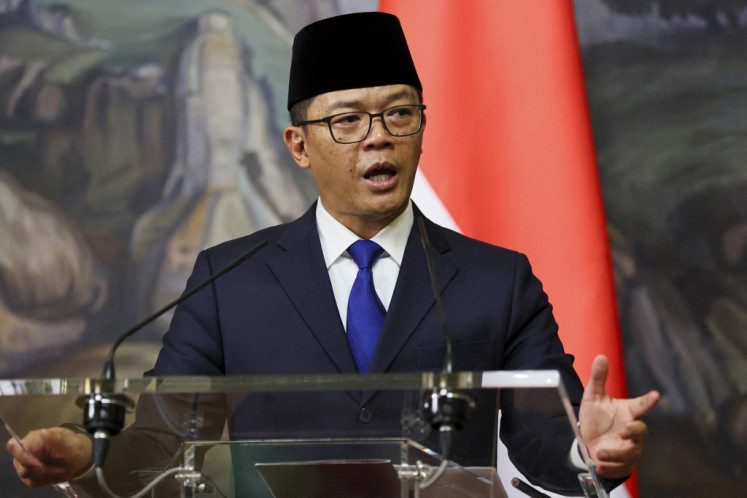Popular Reads
Top Results
Can't find what you're looking for?
View all search resultsPopular Reads
Top Results
Can't find what you're looking for?
View all search resultsCourt rules in favor of native faiths
One step forward: Followers of the Sunda Wiwitan faith attend a trial session at the Constitutional Court in Jakarta on Tuesday
Change text size
Gift Premium Articles
to Anyone

O
span class="caption">One step forward: Followers of the Sunda Wiwitan faith attend a trial session at the Constitutional Court in Jakarta on Tuesday.(Antara/Hafidz Mubarak)
The country’s native-faith followers were jubilant on Tuesday after the Constitutional Court unanimously ruled that they should be given the same rights as adherents of the six major religions officially recognized by the state, though activists say that more work needs to be done to ensure the rights of minority groups are fulfilled.
In a ruling that serves as a milestone in native-faith recognition in Indonesia, the court asserted that Article 61 (2) and Article 64 (5) of the 2006 Civil Administration Law that required followers of native faiths to leave the religion field in their ID cards blank were discriminatory and thus, unconstitutional.
“[The articles] contradict the 1945 Constitution and they are not legally binding,” presiding judge Arief Hidayat said on Tuesday.
Justice Saldi Isra said the disputed articles provided no legal certainty and violated principles of equal justice for all citizens. The articles, he added, had also created difficulties for native-faith followers to obtain e-ID and family registration cards.
By leaving the religion fields blank, native-faith followers had also suffered problems in exercising their rights, including difficulties with marriage registration and accessing civil administration services, Saldi argued.
The religion field on family registration and e-ID cards of people adopting native faiths should now show that they are penghayat kepercayaan (native-faith followers) without mentioning details about their native faith, Saldi added.
Even though the phrase goes in the religion field, the court stressed that agama (religion) and kepercayaan (native faith) are different but equal.
The court’s ruling was welcomed by native-faith followers around the country, who said the court could end discrimination against them and open their access to employment, including as civil servants and security officers.
“We are very happy because the government has recognized native faiths and thus my children have wider access to employment,” said Arnol Purba, a follower of the native faith Ugamo Bangsa Batak from Medan, North Sumatra.
Arnol, who was forced to register himself and his family as Christians to make a living, was among the four native-faith followers who filed a judicial review petition to challenge the 2006 Civil Administration Law in court last year.
Lambok Manurung, a follower of the native faith Parmalim, said thousands of devout Parmalim in North Sumatra welcomed the ruling because for years, they were often pressured to choose among six recognized religions to be shown on their ID cards.
“However, we hope that the religion field on the e-ID could mention that we are a follower of Parmalim,” Lambok said, adding that there were about 6,000 Parmalim followers in the province.
According to Culture and Education Ministry data, there were about 1,200 native-faith groups with at least 12 million followers across the Muslim-majority country in 2016.
Home Minister Tjahjo Kumolo said his office was set to coordinate with the Religious Affairs Ministry and the Culture and Education Ministry to obtain the data of the country’s native-faith followers, which would be put into the civil registration database.
He said the ministry’s Population and Civil Registration Agency (Dukcapil) would be tasked to revise the database, called the Population Administration Information System (SIAK).
“The ministry will propose the second amendment of the law to accommodate the Court’s ruling,” Tjahjo said, adding that the ministry would also disseminate the information throughout the country’s 514 cities and regencies.
Dukcapil director-general Zudan Arif Fakhrulloh said the ministry needed at least one month to disseminate the information to local governments and implement the ruling. “[Native-faith followers] could immediately register themselves at Dukcapil agencies and fill in the civil registration data,” Zudan told reporters.
Activists called the ruling “historic” and “extraordinary” in terms of the country’s progress in recognizing native-faith followers, who have fought for decades to end discrimination against them since the New Order Era.
Muhammad Isnur, a lawyer with the Foundation of the Indonesian Legal Aid Institute (YLBHI), said the government should ensure that other laws also respected the rights of native-faith followers, including access to employment and financial services. “The effect of the ruling is remarkable because ID cards and family registration cards are basic documents in people’s lives,” he said.
The challenge, however, is how the government could ensure that the recognition would also be implemented by state institutions, companies and banks, which also needed to change their administrative forms and documents to accommodate native-faith followers’ rights, Isnur said.
Arya Dipa, Andi Hajramurni and Apriadi Gunawan contributed to this article. from Bandung, Makassar and Medan.









